Roy Troutman found this Brood XIV Magicicada straggler in the Cincinnati Ohio area this weekend. This cicada emerged 2 years after it should have. Amazing.
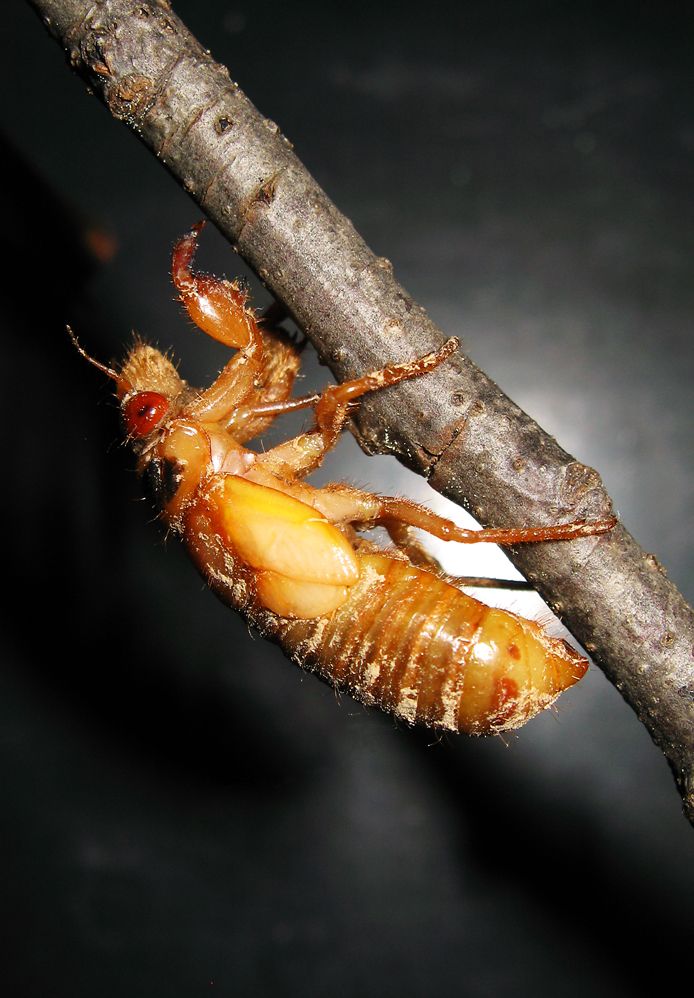
Cicadas have three types of life cycles: annual, periodical, proto-periodical.
Roy Troutman found this Brood XIV Magicicada straggler in the Cincinnati Ohio area this weekend. This cicada emerged 2 years after it should have. Amazing.

Update: Brood XIX straggler photos by Lenny Lampel.
Here’s a treat. Lenny Lampel, Natural Resources Coordinator for Mecklenburg County Park and Recreation Conservation Science Office in Charlotte, NC, uploaded these videos that feature the calls of Magicicada tredecassini to YouTube.
Magicicada tredecassini chorus:
A small chorus of one year early Magicicada tredecassini stragglers of Brood XIX calling from the Lower McAlpine Greenway in Charlotte, North Carolina on May 10, 2010.
Magicicada tredecassini calls :
One year early Magicicada tredecassini stragglers of Brood XIX calling from the Lower McAlpine Greenway in Charlotte, North Carolina on May 10, 2010.
Magicicada cicadas are emerging early across America! You might know them as periodical cicadas, 13 or 17 year cicadas, or “locusts”. When cicadas emerge early (or later) they’re called stragglers.
Chances are they’re from Brood XIX or Brood XXII:
– Brood XIX is set to emerge in AL, AR, GA, IN, IL, KY, LA, MO, MS, NC, OK, SC, TN, VA next year.
– Brood XXII is set to emerge in LA, MS in 2014.
If you see one of these cicadas, report them to Cicadas @ UCONN (formerly Magicicada.org). Cicadas @ UCONN records the location of cicadas and adds them to a map, for scientific purposes.
Image of Magicicada:

Here’s what they sound like:
More information:
I live beside a creek in Stroud area NSW.
Cicadas have been sparse here 2007, 2008 but are deafening again this year … outside work without earplugs is painful due to “song” rain, drizzle or sunny. Loudest with early dawn 1/2 hour crescendo chorus that subsides briefly (approx hour) to begin again unbroken till dusk.
Any idea when they will subside (till next season)?
They began singing in earnest this year approx mid November.
They are great bait for creek Perch but I’m “over” their song.
Comment by helen Gillard — December 30, 2009 [AT] 5:41 pm
Dante- Black princes do have some red “stripes” on them- the colour fades a bit as they age. di you put it on your curtain for a bit?
David.
Comment by David E — December 16, 2009 [AT] 4:49 pm
Hi well i found a black prince cicada that just came out of its shell an hour ago and its just found its colour black but do the red stripes on it mean anything?
Comment by Dante — December 16, 2009 [AT] 2:01 pm
Hello Sam.
I will particpate in your cricket survey. Have some species in my yard and also in nearby parks. I wonder if we can organize this for cicadas. It would be very helpful! In NYC I have documented Tibicen chlormera, Tibicen lyricen and Tibicen linnei. Tibicen auletes reportedly lived in Staten Island as per William T. Davis. Tibicen cannicularis once lived here but since the pines are gone, I don’t think they are around anymore. We can really hone in on ranges of Tibicen cicadas in NY.
Comment by Elias — September 1, 2009 [AT] 3:02 pm
People interested in Cicadas might be interested in applying what we are doing with crickets and katydids to cicada surveys.
http://www.discoverlife.org/cricket
Thanks
sam
Comment by Sam Droege — August 31, 2009 [AT] 7:21 am
I live in
Somerville, Massachusetts
behind an/the historic revolutionary war fort/castle
Prospect Hill
There are Alot of Cicadas here!
Blue, Grey Flannel
& individually are Very loud..shreiking
individusal ones I find alive stuck to my garage & in my driveway
the canopy of trees is so loud sometimes too usually in the pm
Comment by Nancy — August 28, 2009 [AT] 9:54 pm
That is a strange scenario Rosalind. An additional hypothesis to explain this situation is that the cicada that landed on him may have done so by chance. It was likely very hungry and mistook your son for a branch on a tree. They will try to stick their beak into what they think is a branch and that can potentially hurt. It is non intentional.
Comment by Elias — August 28, 2009 [AT] 9:22 pm
Hi — if the cicada in the bag was the one making the sound, the other cicada was probably a female wishing to mate with it.
Comment by Dan — August 27, 2009 [AT] 12:53 pm
I don’t know anything about cicadas! Here is the story: My 8th grader gets extra credit in science for bringing in interesting bugs. I found (what I now know was a cicada) on my porch on it’s back….Dead. Or at least I thought so. I put it in a baggie and left it on the counter overnight. This morning when I handed the baggie to my son, the baggie MOVED and made the LOUDEST sound! Scared me to death. So, cicada in the baggie — not so dead. My son took the baggie with his in his hand to the bus stop. Now, here is where it gets interesting. A cicada flies out of nowhere and lands on my son’s shoulder — and then “sticks” him right after the baggie cicada makes the loud sound again! I can see the mark it left through his t-shirt! Was the other cicada trying to save the baggie cicada???
Comment by Rosalind — August 27, 2009 [AT] 12:15 pm
Met up with Cathy who lives in Coram, New York yesterday. Met her last year during the Brood XIV emergence. Not sure if Tibicen auletes lives in her neighborhood. She may have heard one last year. Additionally may have T. lyricen and T. canicularis too. I think she is catching CICADAMANIA!! Welcome aboard Cathy!
Comment by Elias — August 23, 2009 [AT] 8:52 pm
T. chloromera and T. linnei with a few T. lyricen calling loudly in NY at this time. Excellent year for T. chloromera. Found 7 T. auletes nymphal shells in New Jersey. No luck getting a specimen yet. Glad the message board is back on!!
Comment by Elias — August 18, 2009 [AT] 8:11 am
Heard a very light Tibicen chloromera chorus today in Queens New York. Been waiting a long time!!!
Comment by Elias — July 19, 2009 [AT] 7:25 am
Today is July 13. First Tibicen cicada of the season found. Tibicen chloromera female. 10 dyas behind schedule here in NY!
Comment by Elias — July 13, 2009 [AT] 8:35 pm
Today is July 3rd. The first Tibicen lyricen was heard calling high up in Alley Pond Park (New York). Cicada season has officially started in the North!
Comment by Elias — July 3, 2009 [AT] 10:06 pm
Thanks Elias
Comment by Drachenfanger — July 2, 2009 [AT] 3:34 am
http://www.musicofnature.com/songsofinsects/iframes/specieslist.html
The website
Comment by Elias — July 1, 2009 [AT] 8:49 pm
Guten tag Drachenfanger! Glad you are enjoying our cicadas. A very useful website is “Songs of Insects”. Go to the lower right and click on the cicadas’ species and you will see a large picture with a recording of the call. It is very helpful to figure out which member of the choruis is singing. I visited Deutschland in 1988 and when I was in Bavaria, I believe I did hear a cicada call. they were definitely not as common or as load as here in the US. So I was an Auslaender back then too LOL! Enjoy your stay here in the States.
Comment by Elias — July 1, 2009 [AT] 8:49 pm
Thanks for determining the Type. Today is the loudest day but I assume it is not the peak of loudness. Anyway cool experience for an Auslaender as I am.
Comment by Drachenfanger — July 1, 2009 [AT] 5:56 pm
I agree! The pictures are nice. It has a black pronotal color. I think this is a female Tibicen lyricen. Very nice. Still waiting for Tibicens to come up in New York. It has been extremely rainy here in the North East!
Comment by Elias — July 1, 2009 [AT] 4:36 am
Cool Tibicen photos Drachenfanger.
Comment by Dan — June 30, 2009 [AT] 8:41 pm
Found several cicadas in Virginia Beach two weeks ago. Exciting.
Here some picture I have taken: http://agiesea.blogspot.com/2009/06/was-ist-das-fur-ein-insekt.html
Comment by Drachenfanger — June 30, 2009 [AT] 6:00 pm
I wonder what cadas eat other than tree sap? I AM 12 HAHAHAH
Comment by erica — June 30, 2009 [AT] 9:34 am
I found a cicada in sundre AB. only cicada I’ve evr seen its really weak
Comment by eriaca — June 30, 2009 [AT] 9:25 am
There are many cicadas around Carrollton TX and very many shells
Approxiamatly 50 in my yard.
Comment by Davis B — June 22, 2009 [AT] 2:12 pm
Where was this Hemda?
Comment by Elias — May 30, 2009 [AT] 7:34 pm
this morning I found many cicadas (about 30) stuck to my brick front around the garage. Some wings on the driveway. None were flying at that time and some looked like they were molting.
Comment by Hemda G — May 15, 2009 [AT] 9:42 am
We’ve had at least 60 cicadas on our grass and all over our cars in our driveway the past two days. Many in various stages. What’s weird is that I don’t see any on our neighbor’s property. We do have a very large tree in our front yard. I’m not sure if that has anything to do with it. We live in Springfield, VA (Northern VA).
Comment by Liz Merck — May 15, 2009 [AT] 7:00 am
We have seen cicada’s at our home in Fredericksburg Virginia.
Comment by Judy Johnson — May 10, 2009 [AT] 3:18 am
http://www.flickr.com/photos/37290005 [AT] N07/3431631308/
This isn’t really much of a sighting as much as it’s a picture of my arm with a cicada tattoo. I originally foung my idea for this on your site while looking through all of the different pictures.
Comment by Kate — April 11, 2009 [AT] 6:20 am
Note: no major broods emerged in 2009.
Mary — those are Tibicen cicadas, and they’ll be around for the rest of the summer.
Comment by Dan — August 20, 2009 [AT] 9:00 pm
Yes. Buy The Songs of Insects by Lang Elliott and Wil Hershberger. It has many songs of North American cicadas.
Comment by Dan — August 20, 2009 [AT] 11:55 am
Hi,
does anyone know of commercially available cicada song/call recordings?
I live in Philly Pa. &
we have annual cicadas.
Don’t know the specie
but it produces a metallic/castenet type of sound.I think it’s really cool.
Comment by Bob — August 20, 2009 [AT] 11:42 am
I have seen these in Northern VA/DC area the last two weeks….primarily at my front and back door lights in the evenings. I can hear the trees full of them, which compeltely freaks me out now that I know what they look like.
How long can I expect them to be hanging around town?
Comment by Mary — August 18, 2009 [AT] 5:42 pm
Hello Chris. The Periodical cicadas have come and gone (a small emergence was noted in New Jersey). I live in New York and heard an annual cicada call 2 days ago. They usually take another week or two before they begin a noticeable chorus. Lets keep our fingers crossed and keep listening.
Comment by Elias — July 5, 2009 [AT] 5:32 am
i have a question for the experts im in nj and have not heard cicadas yet and its early july are they going to come in late or not come due to the cold spring?
Comment by chris egan — July 4, 2009 [AT] 11:11 pm
I have more than a dozen holes in my garden and have seen about eight left shells on the house, tree or swing. I have seen this Cicada (see website: http://agiesea.blogspot.com/2009/06/was-ist-das-fur-ein-insekt.html) about two weeks ago and now the neighbor hood is full of the singing. Not all time but loud. What brood is it and what type of Cicada is it. I come originally from Germany and never heard about Cicadas. My position is Virginia Beach, VA, USA
Comment by Drachenfanger — June 30, 2009 [AT] 5:51 pm
Magicicada (the red eyed periodical cicada) ususally are done by the beginning of July in most northern areas. The latest I caught one here was July 2nd in Brookhaven, Long Island. This was last year during the very end of Brood XIV.
Comment by Elias — June 30, 2009 [AT] 7:55 am
How long do they keep up their racket?
Comment by Pam — June 24, 2009 [AT] 12:21 am
Day 20 for my Magicicada and she is no more. Almost 3 weeks, the longest I ever kept one in captivity. Hopefully there are some stragglers still left out there although the cool and rainy weather is not helping at all!
Comment by Elias — June 20, 2009 [AT] 7:18 am
Day 16 for the female from Staten Island. She is still going strong. This is the longest I have ever kept a cicada alive in captivity. Has anyone else seen any Magicicada? May make a trip to Brookhaven soon to see if there was any activity from Brood XIV. Last trip to Fanwood and S.I. revealed no cicadas.
Comment by Elias — June 15, 2009 [AT] 7:20 pm
Day 14 for the Magicicada septendecim female that was captured in Staten Island. A few days ago she oviposited. Not clear if she was able to mate with one of the New Jersey males as she was fairly young while they were in their prime. She looks strong so far. Hopefully she will get the record for longevity!!
Comment by Elias — June 13, 2009 [AT] 6:00 pm
The search yesterday in Staten Island did not turn up any specimens. Saw many beautiful parks: Blue Heron Nature preserve, Clay Pits Pond Park, Wolfe’s Pond Park, and Conference House Park. Found a shell at Clay Pits Park and was told by a park ranger they came up about a week ago. No calling heard. Returned to Fanwood NJ too since I was by the Outerbridge Crossing. Saw lots of shells but they were probably left over from the previous 2 weeks. No calling and no specimens. Has anyone else seen any Magicicada? Seems like the accelerated emergence is all over.
Day 14 in the mini colony. The only one left alive from the original Fanwood Brood is the Massospora stricken cicada. Half the cicada’s body is gone yet she is still alive! This insect never ceases to amaze me!!
Comment by Elias — June 7, 2009 [AT] 6:09 am
Day 12 in the mini colony. Lost the first male yesterday. the second male appears to be tiring. did not hear him call this AM. 3 females still alive, one is the recent Staten Island specimen.
Staten Island news is picking up on the early cicadas and published an article here.http://www.silive.com/news/advance/index.ssf?/base/news/124411770745200.xml&coll=1
Will probably search again over the weekend.
Comment by Elias — June 5, 2009 [AT] 4:05 am
Day 9 in the captive colony. The two males are calling like crazy and the one infected with Massospora is still flicking her wings to keep them going. The female that mated last time has begun to lay eggs in the branches I have in there. I have seen all aspects of their life style. What a cool present nature gave me.
Hope some others are finding stragglers. There are a lot of people in Brood II and Brood XIV land!
Comment by Elias — June 2, 2009 [AT] 7:36 pm
Took a trip to Staten island today. Found 2 cicada burrows in Blue Heron Nature Preserve but no skins/adults. Then went to Wolfe’s Pond Park and found some cast off shells on Sycamore trees only. Then after a long day and a good stroke of luck, 1 nymph came up at 8:30PM on a sycamore tree. He is molting right now and so far the process is going well. Learned a technique from Gerry Bunker and that is to transport nymphs horizontally in a plastic container to prevent them from molting which leads to certain deformity. Day 7 for the rest of the colony. The two males are still calling and one pair mated already.
Comment by Elias — May 31, 2009 [AT] 8:55 pm
Update on my mini colony that is being kept alive in a Butterfly pavilion. One young male started to sing today. The amplitude is very low. Also a female in the cage responded with wing flick signalling. Brought home 8 from New jersey, 6 still alive. Today is Day #4. Next couple of days may need to look in Staten island or back to Fanwood. Anyone have any other reports? I know the weather is terrible. We need some sunshine!!
Comment by Elias — May 28, 2009 [AT] 8:17 pm
Thanks to Charlene’s post I went to Fanwood. found 7 tenerals and captured one nymph which will eclose here in the comfort of my home. Heard some light M. septendecim choruses. did not see any M. cassini or M. septendecula. Some trees where covered with at least 100 exuvia. Some had none. The question is have we seen the maximum yet or is it just starting? Please keep an eye out for further emergence sites here in the North East.
Comment by Elias — May 25, 2009 [AT] 1:10 pm
Can anyone tell me places where cicadas are being seen in New jersey or New York. I will travel to document this interesting accelerated emergence. Parks where they have been observed or street intersections would be of greatest value. Thank you!
Comment by Elias — May 24, 2009 [AT] 7:51 am
Charlene, yes, they’re stragglers even though there are so many. They’re stragglers by virtue of the fact that they’re arriving 4 years early.
Comment by Dan — May 22, 2009 [AT] 7:02 pm
Our NJ town (30 miles west of Manhattan) is covered in Magicicadas. Can they be straggers when the entire town is covered in them? Here are some photos I took today:
http://charlenemc.smugmug.com/gallery/8295055_PTPhV#543177018_samDe
Comment by Charlene — May 22, 2009 [AT] 6:49 pm
Saw a whole lot of cicadas around Cedar Ridge Drive, in (Spotsylvania County) Fredericksburg, VA 22407
Comment by Selena Barefoot — May 18, 2009 [AT] 5:38 pm
We had one of these at our back porch light last night in Carroll County, Virginia. I thought it was some sort of very large bee (looked to be about the size of a humming bird!) but decided to do some research today after work and there it is! I see there have been a number of other sightings in Virginia recently.
Comment by Lori — May 18, 2009 [AT] 3:09 pm
On Monday (Memorial Day) I was lucky enough to find a lone Magicicada septendecim brood II straggler in Metuchen, NJ. This is a male, and he was about 1.5 inches or 3.8 centimeters long.
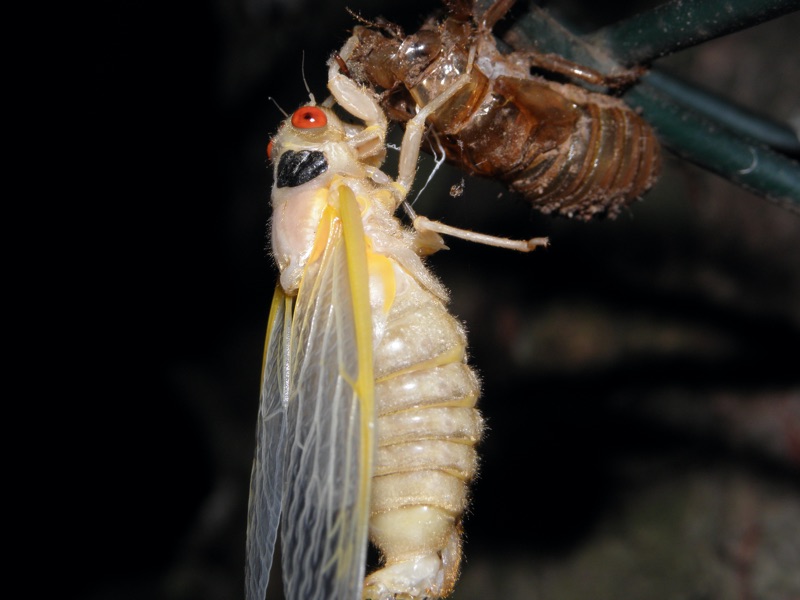
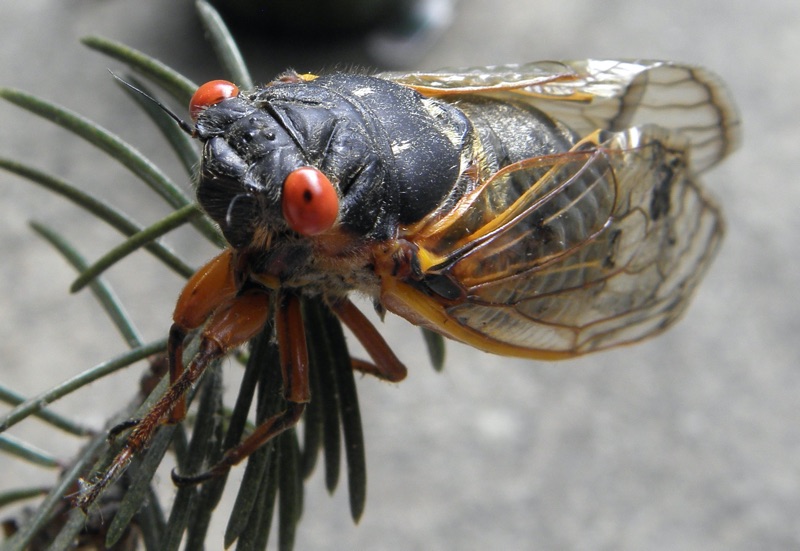
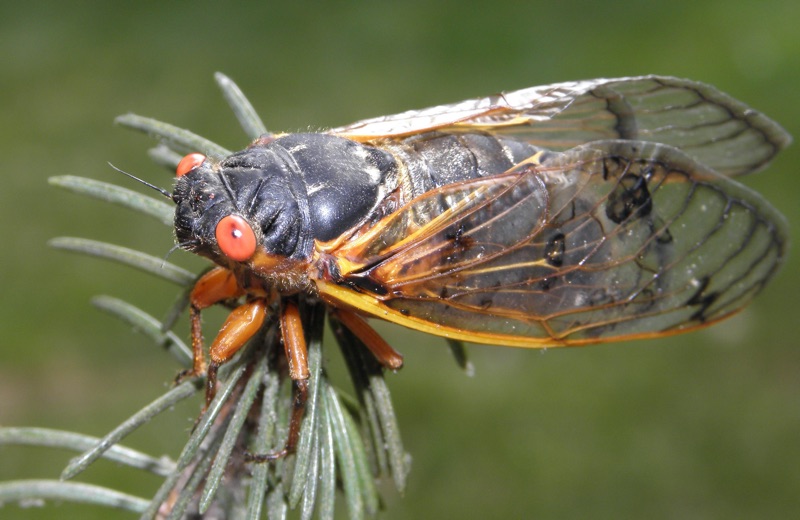
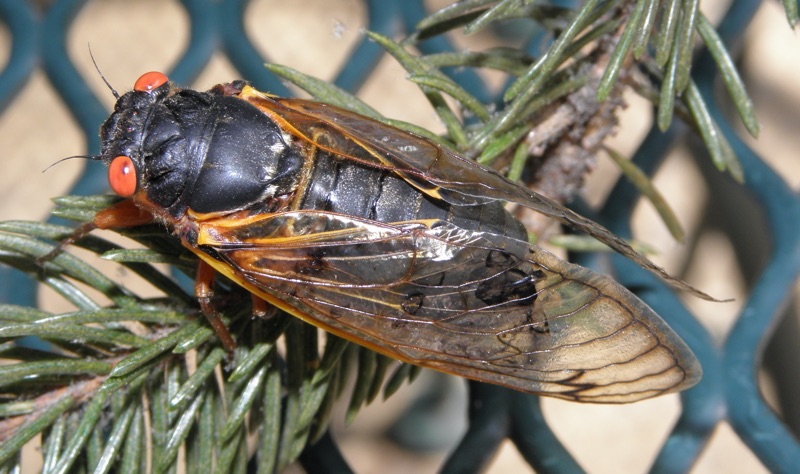
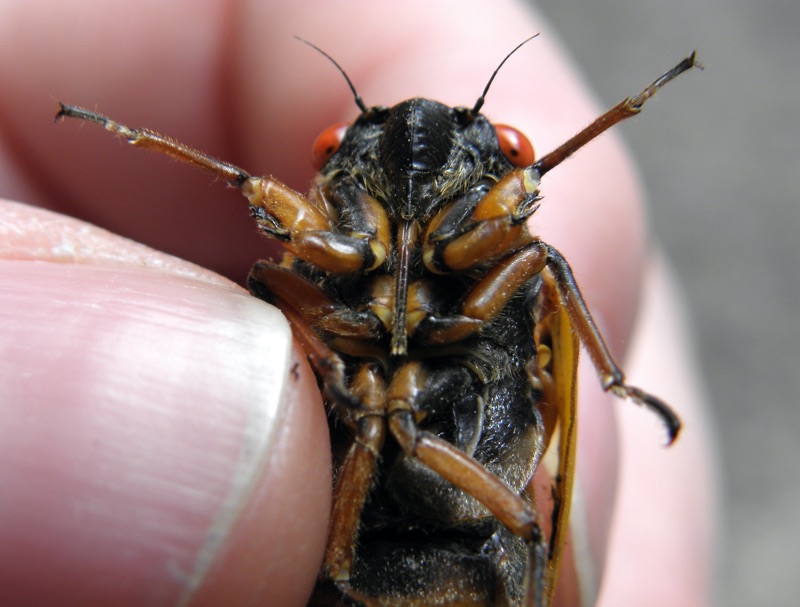
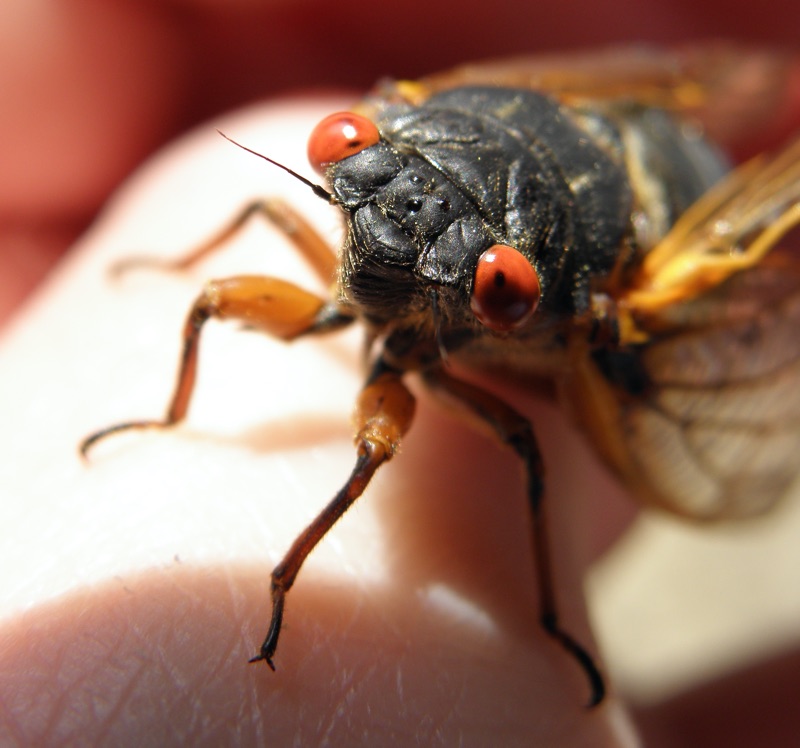
Look for orange coloring between the wing and eye to identify Magicicada septendecim:
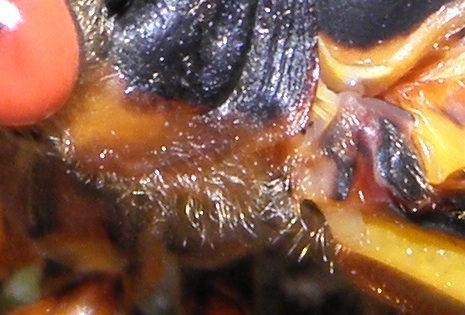
Cicadas have 3 tiny eyes called ocelli:
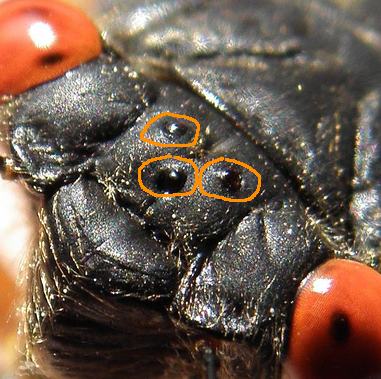
Thanks to Elias for noticing the coloration behind the eye that IDs this as a decim.
So, we already know that Brood II stragglers are emerging in places like North Carolina and Virginia. Brood II cicadas weren’t due until 2013, which means the Brood II cicadas emerging now are emerging 4 years ahead of schedule.
At the same time, Brood XIV stragglers are emerging in Ohio (Batavia, Ohio to be exact). Brood XIV emerged in full-force last year, which means some Brood XIV cicadas emerging now are emerging 1 year behind schedule.
If you compare the Brood II map and Brood XIV map you’ll see they don’t overlap. Hint: open each map in a different browser or browser tab and toggle between the two.
Here’s some pictures of the Brood XIV stragglers Roy Troutman found just tonight in Batavia, Ohio.
John Zyla of Cicadas.info has a report of a Brood II Magicicada (decim) found in Hollywood, St. Mary’s Co, MD.
If you find a cicada make sure you report it to Cicadas @ UCONN (formerly Magicicada.org) (Dr. John Cooley), and if in the Mid-Atlantic region report it to Cicadas.info (John Zyla) as well.
I’m pretty psyched — looks like some Brood II stragglers might emerge in New Jersey.
Tommy Joseph took these photos of Magicicada septendecim emerging Greensboro, North Carolina.
Update: looking at the maps, they probably aren’t brood XIV. Looks like they are Brood II accelerated 4 years, or Brood XIX accelerated 2 years (which would make them 13 year cicadas).
Big pile of skins:
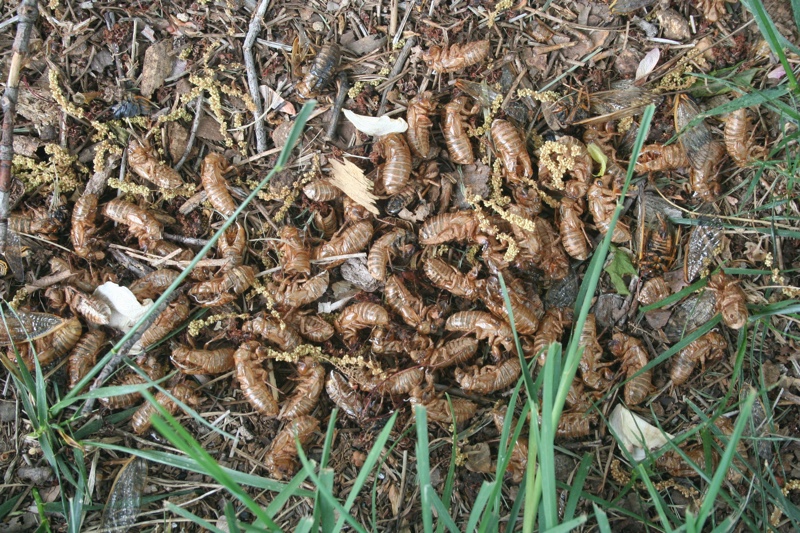
Magicicada with damaged wings:
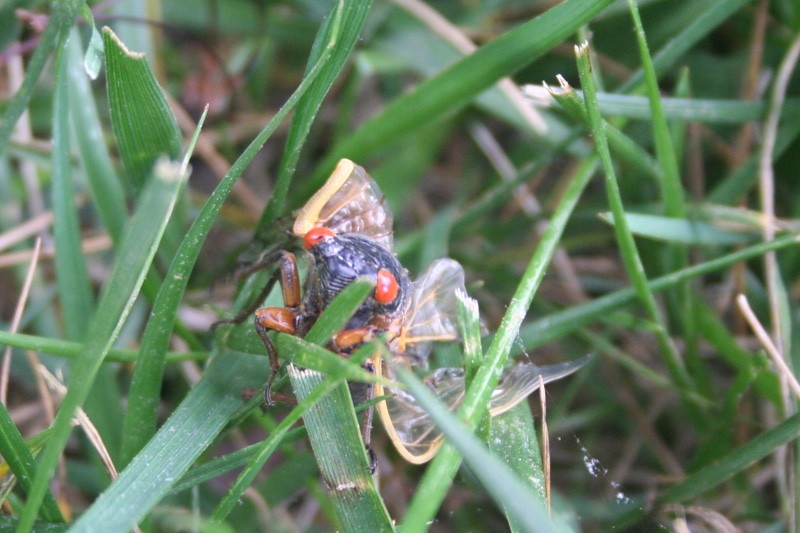
Adult Magicicada:
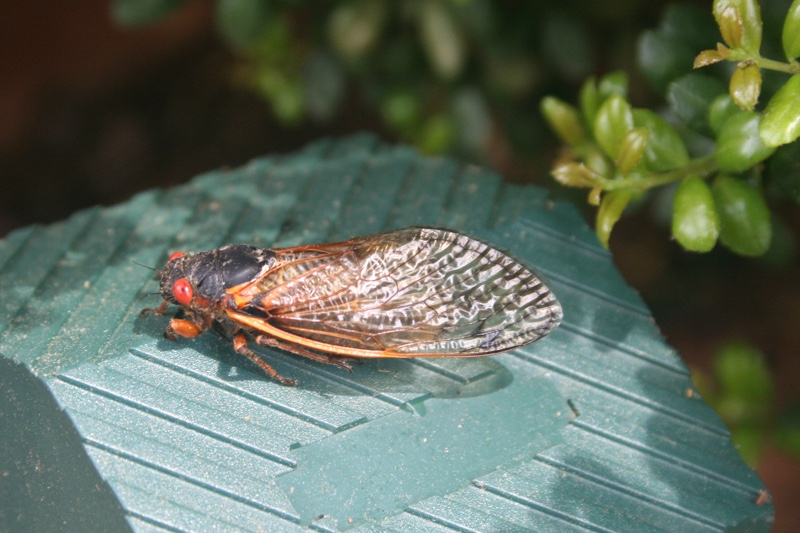
Exuvia/skin/shell:
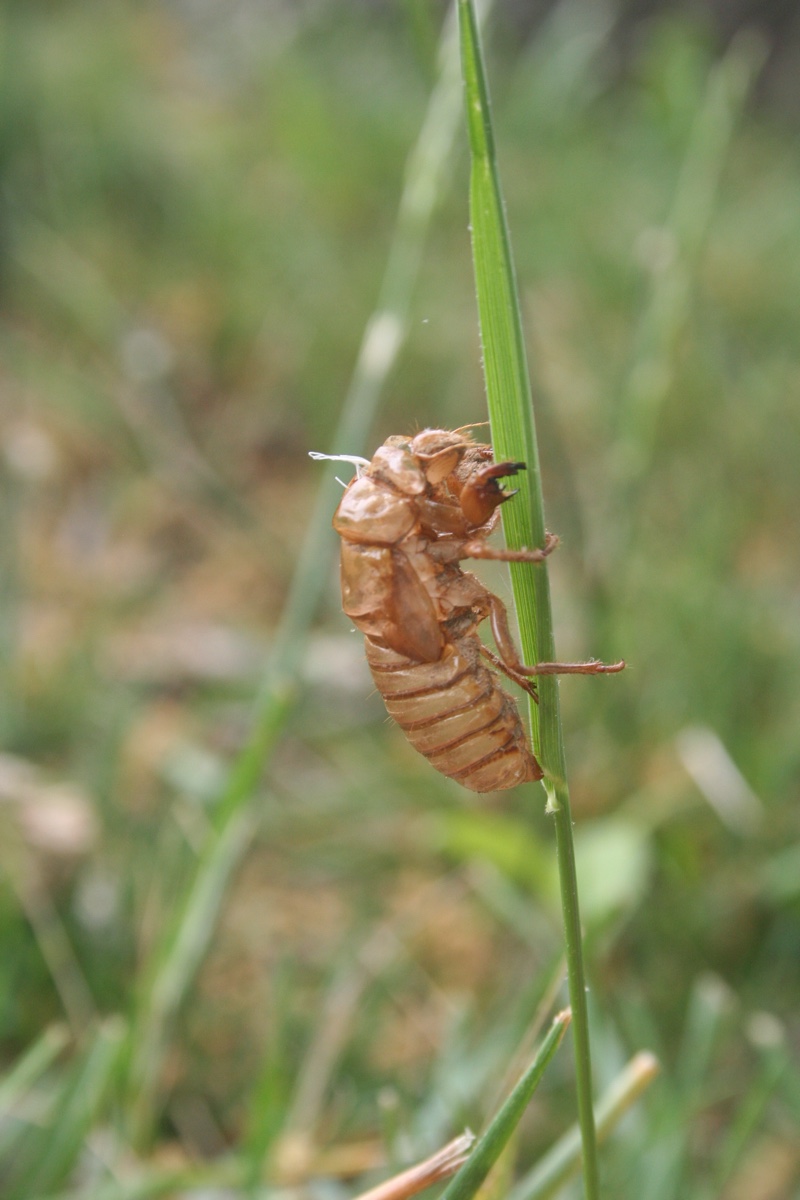
Male Magicicada septendecim:
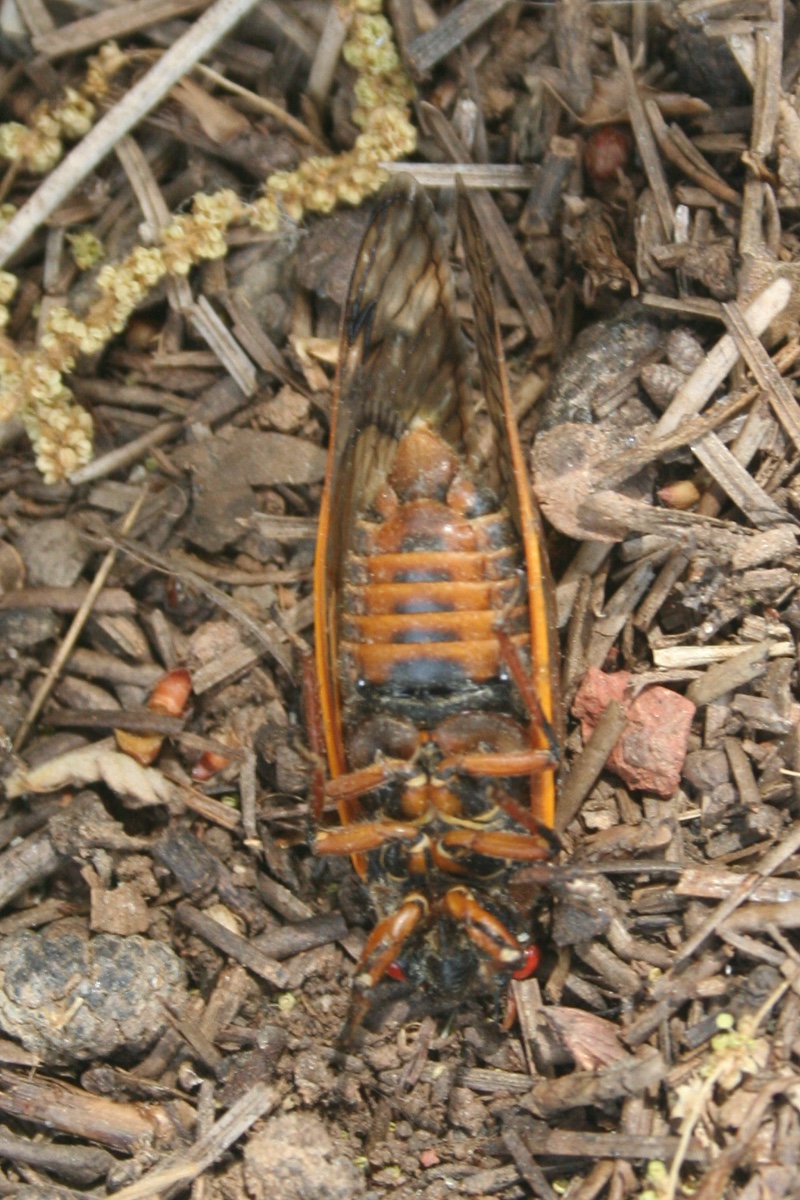
Exuvia/skins/shells on leaves:
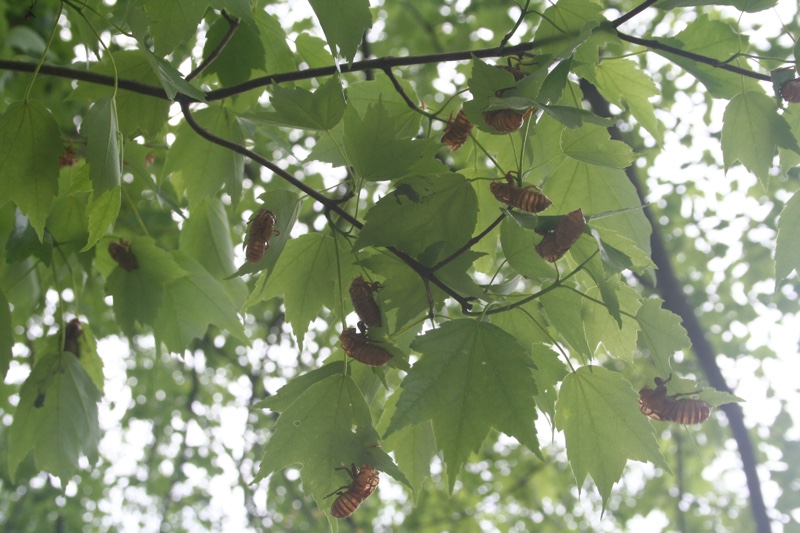
Be on the lookout for Brood XIV stragglers. A few Magicicada that didn’t emerge in 2008 should appear in 2009! Keep your eyes and ears peeled.